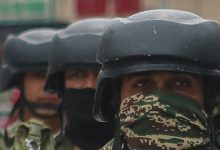
Islamabad has vowed retaliation as the most intense fighting in years broke out between the nuclear-armed rivals A building damaged by a suspected Indian missile attack near Muzaffarabad, Pakistan-controlled part of Kashmir region, May 7, 2025 © AP / M.D. Mughal India has launched “Operation Sindoor,” targeting what it called “terrorist infrastructure” in Pakistan and the Pakistan-controlled part of Kashmir, in retaliation for a deadly terrorist attack in Baisaran Valley. Islamabad condemned the strikes as a “heinous provocation” and vowed retaliation. New Delhi said it hit at least nine targets early Wednesday morning, insisting that the strikes were directed at “terrorist camps” and not the Pakistani armed forces or civilians. “Our actions have been focused, measured, and non-escalatory in nature. No Pakistani military facilities have been targeted. India has demonstrated considerable restraint in the selection of targets and method of execution,” the Indian government said in a statement. Pakistan’s Prime Minister Shehbaz Sharif strongly condemned the Indian operation, describing the strikes as a “cowardly” attack. “Pakistan has every right to respond forcefully to this act of war imposed by India, and a forceful response is being given,” he said. The airstrikes follow the April 22 attack in Baisaran Valley, which left 26 civilians dead. India has held Pakistan indirectly responsible, alleging cross-border militant involvement. The Resistance Front, believed to be tied to the Pakistani-based Lashkar-e-Taiba, initially claimed responsibility for the attack, though later reports indicated that the group distanced itself from it. Islamabad has vehemently denied that it had any role in the attack and has called for an impartial probe. The nuclear-armed South Asian neighbors have fought four wars since both gained independence from the UK in 1947. 07 May 2025 09:28 GMT Islamabad’s National Security Committee has said that Pakistan reserves the right to respond to India’s airstrikes in “self-defense” at a time, place and manner of its choosing, with the military authorized to take “corresponding actions.” The committee also called upon the international community to recognize what it called the “gravity of India’s unprovoked illegal actions” and “to hold it accountable for its blatant violations of international norms and laws.”
The National Security Committee (NSC), was convened under the Chairmanship of the Prime Minister of the Islamic Republic of Pakistan, Muhammad Shehbaz Sharif. The forum offered Fateha for the souls of the innocent civilians martyred in India’s strikes, extended its heartfelt… pic.twitter.com/sWmmcKz3hW — PTV News (@PTVNewsOfficial) May 7, 2025
Moscow has expressed deep concern over the escalating military confrontation between India and Pakistan, which has come in the wake of the April 22 terrorist attack in New Delhi-administered Kashmir. “Russia strongly condemns acts of terrorism, opposes any of its manifestations and emphasizes the need to unite the efforts of the entire international community to effectively combat this evil,” Moscow’s Foreign Ministry said in a statement. Moscow further urged both countries to exercise restraint. “It is hoped that the existing disagreements between New Delhi and Islamabad can be resolved through peaceful means, with Russia advocating for a bilateral resolution in accordance with the provisions of the Simla Agreement,” the Foreign Ministry added. Indian Foreign Secretary Vikram Misri has briefed the media on the country’s strikes on suspected terrorist facilities in Pakistan. Here is a compilation of key points: Indian opposition MP and writer Shashi Tharoor said he applauded the government and stood “solidly” with the armed forces for this morning’s strikes on suspected terrorist targets in Pakistan. “We have made our point and acted in self-defence. Time for all concerned to act wisely to prevent uncontrolled escalation,” Tharoor wrote on X Days before India’s ‘Operation Sindoor,’ Islamabad had suspended the 1972 agreement with New Delhi that aimed to establish lasting peace between the two neighbors. The Shimla Agreement was signed on July 2, 1972 by then-Indian Prime Minister Indira Gandhi and her Pakistani counterpart Zulfikar Ali Bhutto. The agreement had come in the wake of Pakistan’s comprehensive defeat in the 1971 war that split the country and created independent Bangladesh. The document was meant to lay the foundation of a peaceful and stable relationship between the two nations. It was decided that the two countries are resolved “to settle their differences by peaceful means through bilateral negotiations or by any other peaceful means mutually agreed upon between them. ”The treaty mandated that the two countries resolve issues bilaterally, and superseded the United Nations resolution on Kashmir. Perhaps more importantly, under the agreement, India and Pakistan established the Line of Control (LoC), previously called the Ceasefire Line, making it a quasi-border between the two nations. But by suspending the Shimla Agreement, the sanctity of the LoC becomes open-ended. It would be possible for either side to unilaterally take advantage and try to violate it to gain ground, writes Air Marshal Anil Chopra (Retired), an Indian Air Force veteran and the former Director-General of the Center for Air Power Studies in New Delhi. China has said that it found India’s strikes on suspected terrorist targets in Pakistan “regrettable,” while adding that the country opposed “all forms of terrorism.” Expressing concern about the ongoing situation, the Chinese Foreign Ministry said, “We urge both sides to act in the larger interest of peace and stability, remain calm, exercise restraint and refrain from taking actions that may further complicate the situation.” Israeli Ambassador in New Delhi has expressed support for India’s strikes on suspected terrorist targets in Pakistan. “Israel supports India’s right for self defense. Terrorists should know there’s no place to hide from their heinous crimes against the innocent,” Reuven Azar posted on X. Indian Defense Minister Rajnath Singh has spoken with the chiefs of the Army, Navy, and Air Force following the precision strikes in Pakistan on multiple terrorist hideouts on the night of May 6-7, according to local media reports. The Defense Ministry will hold a press briefing on the operation at 10 am local time (04:30 GMT), where more details will be officially shared. Indian Foreign Minister S. Jaishankar wrote a post on X in the wake of Operation Sindoor. “The world must show zero tolerance for terrorism,” he said. Hospitals, rescue teams, and administration in Pakistan’s Punjab province will be on alert, while schools are to be closed throughout Wednesday, the region’s chief minister Maryam Nawaz Sharif has announced. More




